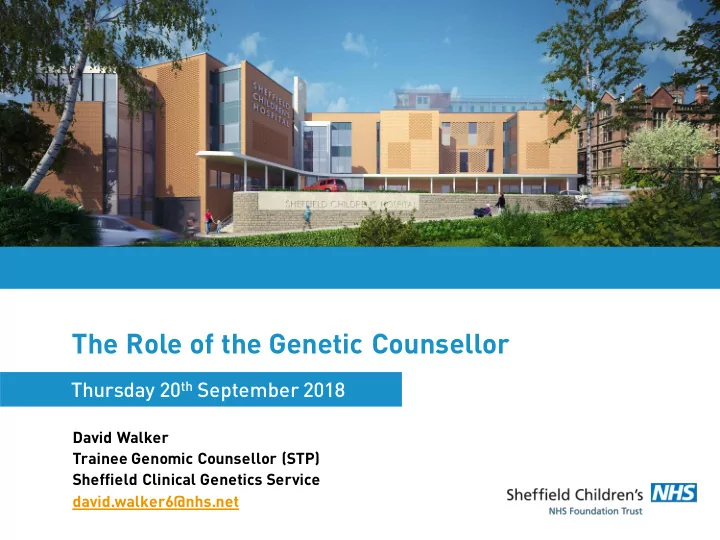

The Role of the Genetic Counsellor David Walker Trainee Genomic Counsellor (STP) Sheffield Clinical Genetics Service david.walker6@nhs.net Thursday 20 th September 2018
Agenda ▪ What is genetic counselling? ▪ What can and can’t we do? ▪ The patient experience ▪ Consanguineous communities/families ▪ The future of genetics
Who are we? Lead Consultant Clinical Geneticist Clinical Genetics Manager Lead (Nurse) Genetic Consultant Counsellors Clinical Geneticist Research Team Co-Ordinators Genetic 100,000 Counsellors Specialist Genomes Project Registrars Secretaries & Clerks Trainee Genetic Counsellors IT Me!
What do you actually do? A Genetic Counsellor will: 1. Identify the needs of the individual or family and use an empathic approach when ▪ giving genetic counselling 2. Collect, select, interpret, confirm and analyse information (including family and medical ▪ history, pedigree, laboratory results and literature) relevant to the delivery of genetic counselling for individuals or families 3. Help people understand and adapt to the medical, psychological, social and ▪ familial implications of genetic contribution to disease 4. Assess the chance of disease occurrence or recurrence ▪ 5. Provide diagnostic information to clients based on family and/or medical history ▪ and/or genetic testing 6. Provide education about inheritance, testing, management, prevention, resources and ▪ research to relevant individuals or families and other healthcare professionals 7. Promote informed choices and psychological adaptation to the condition or risk of ▪ the condition 8. Apply expert knowledge to facilitate the individual or family to access the appropriate ▪ healthcare resources , including a medical diagnosis and resources for management of the condition. GCRB – What is genetic counselling? (2017) Available at: http://www.gcrb.org.uk/
What do you actually do? Scenario : a couple have a child affected with cystic fibrosis (CF) and want to know the chance of having another child affected with the condition. Problems : Is all of this information accurate? Who should be tested first? What about estranged relatives? P 9yo 7yo 3m 15/40
What do you actually do? ▪ Provide information about genetic contribution to disease and offer tests ▪ Diagnostic ▪ Carrier/Predictive ▪ Prenatal ▪ Convey complex information in lay language ▪ What is a genome? A chromosome? A gene? DNA? Types of inheritance? Mosaicism? X-inactivation? ▪ “Mutations”? ▪ VUS? ▪ Negative test result?
What do you actually do? ▪ Helping patients to make informed decisions ▪ Is testing appropriate – clinically, emotionally? Timing? ▪ Autonomy; non-directive; confidentiality ▪ Consent ▪ Offer/initiate testing if appropriate ▪ Consent & phlebotomy ▪ Organising samples/consent/information sharing
What do you actually do? ▪ Explanation of results ▪ Organising follow-ups ▪ Making new referrals, e.g. breast/gynae ▪ Support ▪ Counselling ▪ Dealing with grief/loss/death, attachment, family dynamics, guilt, depression/MH issues, anxieties/”cancer worry” ▪ Helping to communicate information through families ▪ Further referrals, e.g. Cavendish centre, or therapy
Patient Experiences: Scenario 1 “I would be grateful if you could see this pleasant 40 year old lady, who has recently been diagnosed with a stage 4 triple-negative breast cancer. She says her mum had breast and ovarian cancer at 42 and died at 63. She has 3 young daughters and is worried about their risks of developing cancer. ”
Patient Experiences: Scenario 1 ▪ Does the patient actually want to be tested? ▪ What is the motivation to seek testing? ▪ What makes them feel the most safe? How do they cope with threats? ( aunty’s burglar) ▪ What do they understand about the reason they are in genetics? ▪ “GP sent me” vs “I really want to be tested” ▪ Is now the right time to consider testing? ▪ Fast-tracks, life events etc ▪ Age of daughters?
Patient Experiences: Scenario 1 ▪ What kind of support do they have? ▪ Alone? ▪ Preparedness for other relatives ▪ Results ▪ Relief, empowerment, being looked after ▪ Grief, anxiety, depression, guilt ▪ Running out of the room vs not leaving the room vs not caring in 2 weeks vs not moving in 16 weeks ▪ Testing not available ▪ Low/moderate risk – still have to live with “risk” ▪ Need to test someone else, e.g. living affected relative ▪ No one alive to test
Patient Experiences: Scenario 1 ▪ NB: not intended to convince people not to seek testing, but to challenge whether it is right for them, at that time ▪ Anecdotally – very few BME patients? ▪ Stigma? ▪ Barriers in accessing healthcare? ▪ Minority groups = fewer patients? ▪ Self-selecting group of people motivated to test
Patient Experience: Scenario 2 ▪ 4 year-old boy with autism, learning difficulties, speech delay, mild dysmorphic/facial features ▪ Baseline genetic testing performed by paediatrician ▪ Helpful diagnosis? ▪ Variant of uncertain significance? ▪ Parents tested ▪ One parent has same thing/similar problems ▪ Neither parent has same variant ▪ Chance of happening again? ▪ Further testing in the family?
Consanguinity / Close-Knit Communities ▪ As standard – always ask about consanguinity ▪ BRCA & Fanconi Anemia - Ashkenazi Jewish ▪ Sickle Cell Anemia – Asian & African American ▪ Cystic Fibrosis – Caucasian/British ▪ Haemochromatosis – Traveller community ▪ Bowel cancer – recessive genes
Consanguinity / Close-Knit Communities ▪ Similar consultation to any referral but may alter management or testing protocol ▪ Usually either referred due to new diagnosis or as follow-up genetic testing ▪ Support from then on for the family but not usually before ▪ “Counsellor” ▪ Little capacity for long-term support ▪ Rarely – home visits ▪ “I do not need to see genetics because my partner and I are not related”
Communicating Genetics ▪ Wellcome Genome Campus - https://societyandethicsresearch.wellcomegenomeca mpus.org/ ▪ Music of Life ▪ https://vimeo.com/album/5216273 ▪ Socialising the Genome ▪ https://vimeo.com/album/4647208 ▪ Online courses (e.g. HEE Whole-Genome Sequencing) ▪ https://www.futurelearn.com/courses/whole-genome- sequencing?utm_source=gep- website&utm_campaign=wgsfl&utm_medium=referal
The Future of Genetics ▪ Laboratory reorganisation ▪ Genomic testing ▪ 100,000 Genomes Project results ▪ “Mainstreaming genetics” ▪ Likely to find more ▪ More diagnoses? ▪ More uncertainty? ▪ Role of genetics services?
Recommend
More recommend